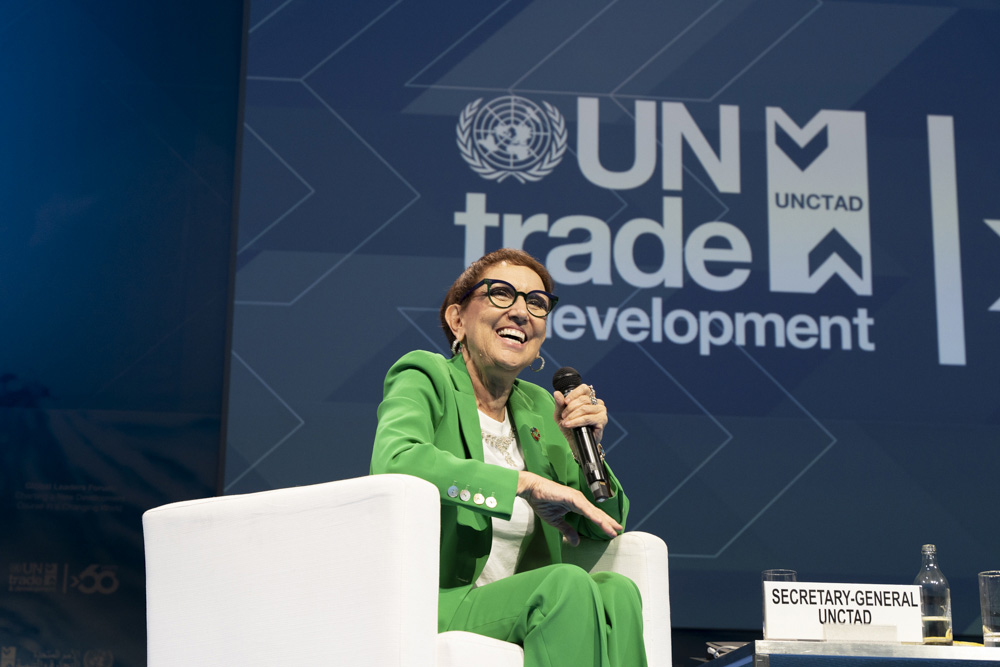The digital economy could be a boon for small businesses and developing economies, but the fast pace of change and the investments and policy support required, could leave these often-voiceless players out of the digital economy, creating even greater global economic divide and hindering democracy, said Rebeca Grynspan, Secretary General of the United Nations Conference on Trade and Development (UNCTAD).
Grynspan spoke with Ian Kerr on the UPU “Voice Mail” podcast to highlight the organizations’ missions and challenges, as well as the UPU’s role, in creating an inclusive global digital economy.“Our strongest objective is for UNCTAD to be able to help developing countries navigate the complexities of development,” Grynspan said, “to allow them to participate in a fairer international economy, to strengthen their advocacy for the reforms that have to happen … for a better life for everybody.”
Yet this is an era of rapid change, with added pressures of global crises, and transition does not happen equally. Governments need to know how to support Micro-, Small and Medium-sized Enterprises (MSMEs) to utilize the digital world, to increase productivity, and to connect to markets. To do so requires knowledge of strategy, local markets, business dynamics inside countries, and resources to finance transformation.
“That is what we are about,” Grynspan said. “We see tremendous opportunities, but we see very important risks. If you don't support the small- and medium-size enterprises, … the concentration of this new economy in very few hands will, in my opinion, hurt democracy and economic stability.”
UNCTAD works to bridge this divide with programmes such as “Empretec”, an entrepreneurship global network that helps to train small businesses, to help them scale up, and enter the digital economy. It also connects with policy makers to help governments foster a growth environment for MSMEs.
UNCTAD also hosts “eTrade for Women”, which provides a platform for successful entrepreneurs to share their experiences with other women.
“We don't represent them,” Grynspan said. “We give them the international platform, the space for them to bring their experience, to talk to other women, to influence policies.”
Grynspan noted the importance of women supporting other women, as she herself is the first woman to lead UNCTAD in its 60-year history, which she credited to the efforts of other women before her who fought for equality.
The Universal Postal Union is well positioned to support these efforts, Grynspan said. When posts become more effective, less costly, and expand their reach: “these businesses will have a real partner in the UPU and the postal services in their countries. … You cannot enter to the era of e-commerce without the postal service.”
However, “cascading crises” during her tenure have created additional barriers. The COVID-19 pandemic, in one year, wiped out a decade’s worth of growth for developing countries working to reduce poverty and hunger, she said. Then came the war in Ukraine, the cost-of-living crisis, the food insecurity crisis, and the Middle East conflict.
“These cascading crises … have really impacted disproportionately the countries that are more vulnerable and the poorest in the world,” Grynspan said, which is similarly true for the impacts of climate change.
Such disproportionate challenges could be supported by strengthened multilateralism, Grynspan said, referring to the recent UN Summit of the Future (held after Grynspan’s comments were recorded).
“Fragmentation and self-interest of a few won't get us to a better world,” she said. “If it's only a power game, and not ... based on internationally agreed rules of the game, the small and vulnerable will not be able to survive or to play in that world.”
Listen to the full Voice Mail episode with Rebeca Grynspan here: https://soundcloud.com/universal-postal-union/episode-29-leading-the-future-of-fair-and-inclusive-trade
